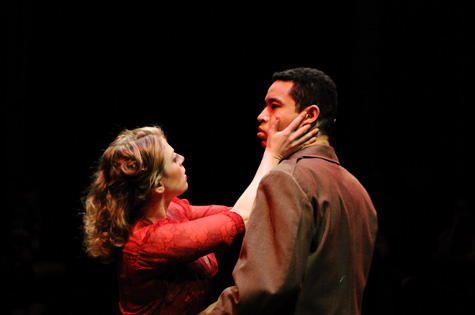
CAUSTIC COUPLE Gibel and Shaw. Photo: MARK TUREK |
Woyzeck isn't a play, it's a Rorschach inkblot test for directors and theater companies. German dramatist Georg Büchner left it incomplete at his death in 1837. But its theme of dehumanization by authority has enough timeless staying power for several editors and playwrights to have head-scratched and rearranged and come up with several versions, each tentatively final.
The Brown/Trinity Rep Consortium is staging Woyzeck (through December 19) as a thesis project in its MFA program, directed by Christopher Windom. Since Büchner died at age 23, before his shock at man's relentless inhumanity to man had time to wear off, he would appreciate his work being produced by grad students around his own age.
This is not a naturalistic play, but rather dreamlike, expressionistic, the fears and rages felt on stage often lurking around afterward like spectral goblins. Much of the dialogue is arch and stylized.
Windom and dramaturg Kristin Idaszak have brought this all down to earth as much as they could, setting it in post-WWII America and making the title character an African-American fearful of the Klan. It's hard to think of greater cognitive dissonance: on the one hand having risked his life in war; on the other, returning to prohibited drinking fountains and being spit upon. That certainly trumps the existential anomie of most playwrights.
Since many of the exchanges are overwrought, much of this production's effect has to be from other than words. The set design by Patrick Lynch provides such subtext. On one side is a tall corrugated wall and door, cold and as impersonal as an airplane hangar; across from that is a billboard painted on red brick, a Ponds cold cream ad with a beautiful, Kabuki white face next to the phrase "For Pure Skin," with the "k" nearly worn off.
The character that applies to is Marie (Rebecca Gibel), played all-stops-out as a booty-shaking sexpot. She calls herself a whore, as do others, but she softens when she is holding her baby, fathered by Woyzeck (Will Shaw). He also mellows out when he is with this family — except for the moments when he's blood-eyed with suspicion of Marie being unfaithful.
There is one crucial scene that wouldn't survive tinkering in this play's many permutations. Personifying chest-thumping, atavistic male egotism is the Drum Major (Matt Clevy), whose job literally is to strut. He soon has an eye out for Marie, among other body parts, and when he attacks her alone in her kitchen, she soon gives in, saying, "I don't care. It's all the same." A court, or her conscience, would find uncertain whether it was technically rape, a useful ambiguity here.
Other caricature characters torment Woyzeck. The snarling Captain (Patrick Mulryan) pays him for shaves and to suffer abuse at his ranting, such as how poor people like Woyzeck have no hope of being virtuous. The Doctor (Karl Gregory) does the best broad acting job of the evening, entertaining us with verbal tics and fidgets as he tortures Woyzeck with dire health predictions and insists he eat nothing but peas. At one point he gives a pronouncement from high on a tall ladder. This scene is captivating, as Gregory whirls and scampers about like a rat in a cage, though smug with power. Director Windom's background in choreography came in handy here.